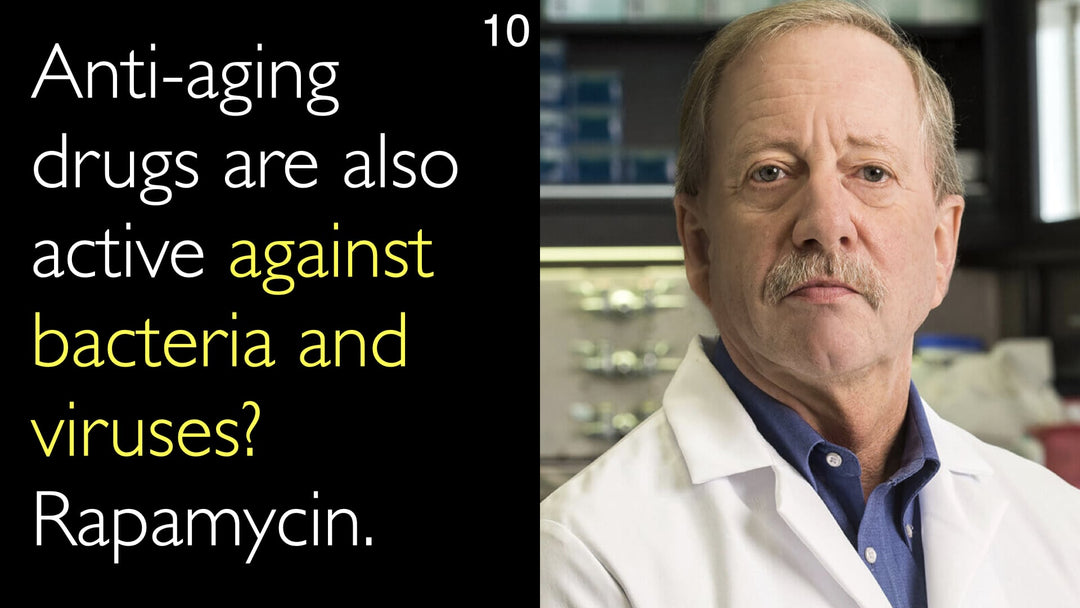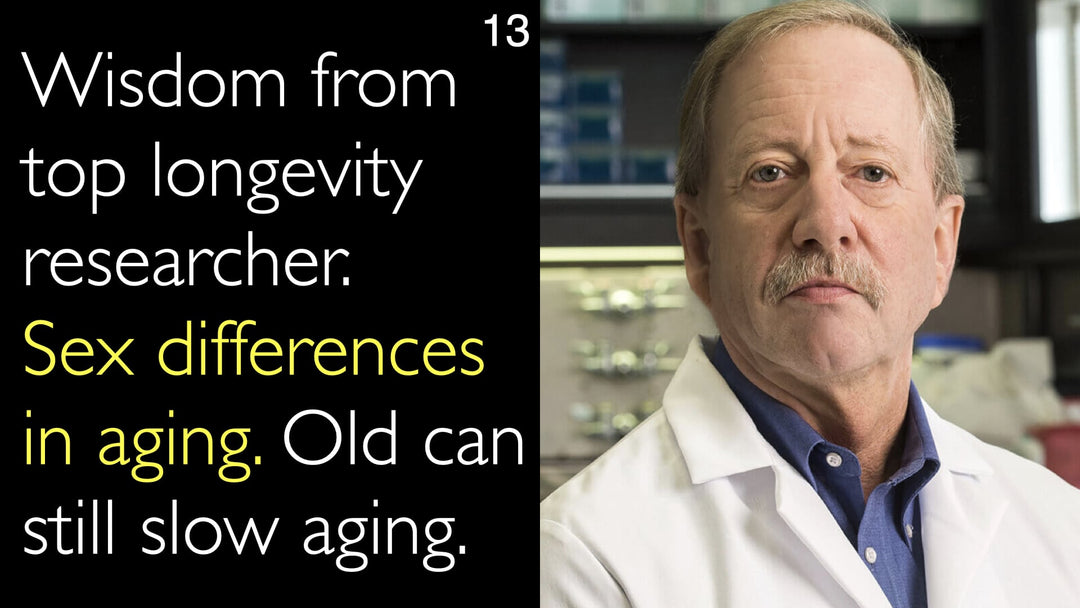Dr. Steven Austad, MD, PhD, ein führender Experte auf dem Gebiet der Altersbiologie, erläutert, wie Anti-Aging-Medikamente wie Metformin und Rapamycin über antivirale und antibakterielle Eigenschaften verfügen könnten. Er bezieht sich auf faszinierende Daten aus der COVID-19-Pandemie, die eine geringere Sterblichkeit bei Diabetespatienten unter Metformin-Therapie nahelegen. Zudem hebt Dr. Austad seine eigene Forschung hervor, die eine schützende Wirkung von Rapamycin gegen Pneumokokken-Pneumonie bei Mäusen zeigt. Er plädiert für rigorose klinische Studien, um diese Effekte zu bestätigen. Diese Forschung könnte wegweisende Behandlungsansätze für künftige Pandemien liefern.
Anti-Aging-Medikamente und ihre potenzielle Rolle bei der Bekämpfung von Infektionen
Direkt zum Abschnitt
- Metformin und Rapamycin: antivirale Effekte
- COVID-19-Pandemie-Datenanalyse
- Senolytika: antivirale Eigenschaften
- Rapamycin-Studie bei Pneumokokken-Pneumonie
- Strategien zur Vorbereitung auf künftige Pandemien
- Klinische Studien zu Anti-Aging-Medikamenten
- Vollständiges Transkript
Metformin und Rapamycin: antivirale Effekte
Anti-Aging-Medikamente wie Metformin und Rapamycin könnten bedeutende antivirale Eigenschaften besitzen. Dr. Steven Austad, MD, PhD, erörtert neue Erkenntnisse, wonach diese Medikamente die antivirale Reaktion des Körpers verstärken können. Diese potenzielle Doppelfunktion macht sie für die medizinische Forschung besonders interessant. Die zugrundeliegenden Mechanismen werden noch untersucht, könnten aber die Infektionsbehandlung revolutionieren.
COVID-19-Pandemie-Datenanalyse
Die globale COVID-19-Pandemie lieferte unerwartete Daten zu diesen Medikamenten. Dr. Steven Austad, MD, PhD, weist darauf hin, dass Menschen mit Diabetes, die Metformin einnahmen, niedrigere COVID-19-Sterblichkeitsraten aufwiesen. Ähnliche Muster wurden bei der Einnahme von Rapamycin während der Pandemie beobachtet. Dr. Anton Titov, MD, und Dr. Austad betonen, dass diese Notfallstudien sorgfältig interpretiert werden müssen und durch strengere Forschungsmethoden bestätigt werden sollten.
Senolytika: antivirale Eigenschaften
Senolytika stellen eine weitere Klasse von Anti-Aging-Substanzen mit potenziellen antiviralen Vorteilen dar. Dr. Steven Austad, MD, PhD, erwähnt Studien, die zeigen, dass Senolytika sowohl bei Mäusen als auch beim Menschen antivirale Effekte aufweisen. Diese Medikamente wirken, indem sie gealterte, dysfunktionale Zellen beseitigen, die Entzündungen fördern. Diese zelluläre Säuberung könnte die Fähigkeit des Immunsystems verbessern, Virusinfektionen wirksam zu bekämpfen.
Rapamycin-Studie bei Pneumokokken-Pneumonie
Dr. Steven Austad, MD, PhD, führte wichtige Forschungen zu den Effekten von Rapamycin bei bakteriellen Infektionen durch. Seine Studie untersuchte die Auswirkungen von Rapamycin auf Pneumokokken-Pneumonie, die vor COVID-19 die häufigste infektiöse Todesursache bei älteren Menschen war. Die Forschung zeigte einen schützenden Effekt gegen diese schwerwiegende bakterielle Infektion, zumindest in Mausmodellen. Dies deutet darauf hin, dass Rapamycin die Immunität gegen verschiedene Pathogenarten stärken könnte.
Strategien zur Vorbereitung auf künftige Pandemien
Dr. Steven Austad, MD, PhD, betont die Bedeutung der Vorbereitung auf künftige Pandemien. Er weist darauf hin, dass eine weitere Pandemie unvermeidlich ist, ob viral oder bakteriell. Die Forschung zu Anti-Aging-Medikamenten könnte entscheidende Präventionsstrategien und Behandlungen liefern. Dr. Anton Titov, MD, diskutiert diese Möglichkeiten mit Dr. Austad und hebt deren potenzielle Bedeutung für die globale Gesundheitssicherheit hervor.
Klinische Studien zu Anti-Aging-Medikamenten
Sowohl Dr. Steven Austad, MD, PhD, als auch Dr. Anton Titov, MD, betonen die Notwendigkeit ordnungsgemäßer klinischer Studien. Die Notfall-Pandemiestudien liefern faszinierende Hinweise, erfordern aber eine Bestätigung durch kontrollierte Forschung. Dr. Austad plädiert für gut konzipierte Studien, die ohne Notfalldruck durchgeführt werden. Diese Untersuchungen könnten endgültig klären, ob Anti-Aging-Medikamente tatsächlich Schutz vor Infektionen bieten. Die Bestätigung dieser Effekte würde einen bedeutenden medizinischen Fortschritt darstellen.
Vollständiges Transkript
Dr. Anton Titov, MD: Wir leben weiterhin in einer globalen COVID-19-Pandemie. Es gab einige Daten, dass Metformin die antivirale Reaktion verstärken kann. Menschen mit Diabetes, die Metformin einnahmen, hatten eine geringere COVID-19-Sterblichkeit. Gleiches galt möglicherweise für Rapamycin.
Was ist für die antiviralen Effekte von Metformin und Rapamycin verantwortlich? Handelt es sich um einen echten antiviralen Effekt?
Dr. Steven Austad, MD: Wir müssen all diese Studien vorsichtig betrachten. Sie wurden unter Notfallumständen durchgeführt. Wir sollten sie mit Vorbehalt betrachten, bis sie bestätigt und erweitert werden.
Ich sollte auch sagen, dass es eine Studie zu einigen dieser Senolytika gibt, zumindest bei Mäusen. Und beim Menschen scheinen Senolytika ebenfalls einen antiviralen Effekt zu haben.
Also würde ich Folgendes sagen: Hoffen wir, dass die Pandemie abzuklingen scheint. Und wir drücken die Daumen, dass das so bleibt.
Jetzt ist die Zeit, klinische Studien zu diesen Medikamenten in einer entspannteren Langzeitperspektive durchzuführen und herauszufinden, ob dies zutrifft. Wenn es zutrifft, ist es unglaublich wichtig.
Ich führte eine Studie mit einem Kollegen durch, in der wir die Wirkung von Rapamycin auf Pneumokokken-Pneumonie untersuchten. Es ist die häufigste infektiöse Erkrankung, die vor COVID-19 ältere Menschen tötete. Und es hatte ebenfalls einen schützenden Effekt, zumindest bei Mäusen.
Also nochmals: Bis zur nächsten Pandemie, denn sie wird kommen, könnten wir, wenn es eine Virus-Pandemie ist, einige sehr gute Behandlungen und Präventionsstrategien ausgearbeitet haben. Das ist zumindest meine Hoffnung.







